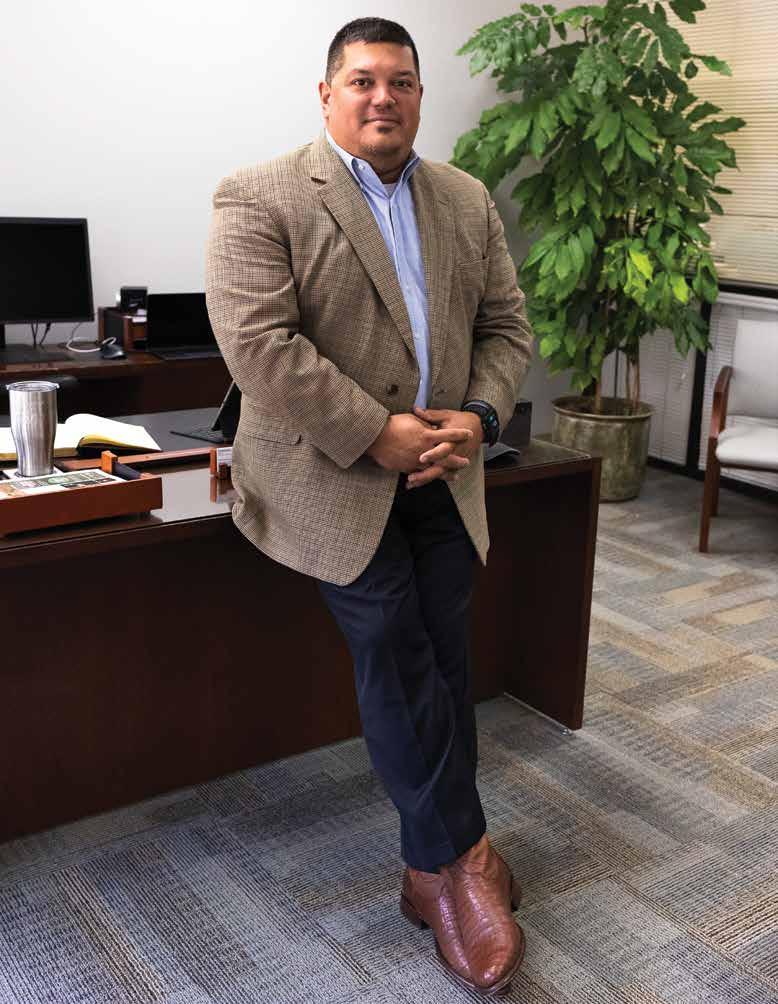
9 minute read
Rob Anderson
Get to Know JARROD YATES,
Arkansas Farm Bureau’s Director of Public Affairs & Government Relations
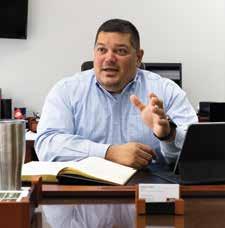
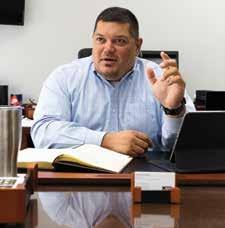

In August, Jarrod Yates was hired as director of public affairs and government relations at Arkansas Farm Bureau. In his new position, Yates will lead the national affairs efforts on behalf of the organization and lobby the state’s Congressional delegation and assist in executing the political and legislative strategies defined by the roughly 190,000-member organization.
A former chief of staff for Congressman Mike Ross, Yates, 40, has spent the past seven years helping lead governmental relations at Arkansas Blue Cross and Blue Shield, the state’s largest health insurance provider.
Yates spent four years as Ross’s chief of staff, simultaneously managing five offices and staff in Washington, D.C. and in the Fourth Congressional District.
“Jarrod brings a great understanding of Arkansas agriculture and the political landscape in Arkansas and Washington, D.C.,” said Stanley Hill, vice president of public affairs and government relations at Arkansas Farm Bureau. “Jarrod comes highly recommended and is very well respected at our State Capitol and in Washington, D.C., and he will be a great addition to our staff.”
We took some time to get to know Jarrod, his connection to agriculture and how it feels to become a part of the Arkansas Farm Bureau family.
Tell us about your background – your family, your childhood and your connection to agriculture. “I was born in Fayetteville, but moved to Prescott, when I was young, I went to middle school and graduated from high school in Prescott. My dad graduated from the poultry science department at the University of Arkansas, so right out of college he went into the poultry industry. He worked for Hudson Foods and then Tyson, so my dad was in the poultry business for as long as I can remember. When I was a little kid in Fayetteville, we had
Qtwo chicken houses and cattle, and then when we moved to south Arkansas, we had cattle. I still have cattle in Prescott together with my JY brother and my dad.”
Growing up, what were you interested in doing for a career and how did you end up in politics?Q
“Growing up, law enforcement was something I was always interested in and that was what JYI was focused on in high school. But, you know, law enforcement can be a tough way to make a living.
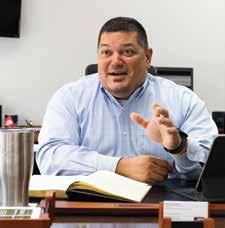
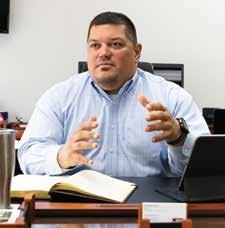
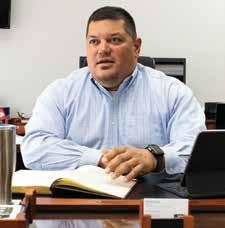
During my first year of college, Mike Ross, who was from our town and went to our church, decided to run for Congress. I was very apolitical at that point and didn’t know anything about politics, but I’d known Mike for a long time. He and his wife Holly, who was a pharmacist, owned the drugstore in town, and in high school – my senior year – I would deliver orders for them. I’d also sweep, mop the floor, whatever I could do. I showed up on time and did a good job, so when he decided to run, he was looking for people to work for him who were dependable and could be counted on and I fit the bill. That’s really how I got involved in that.” What was your time in Washington D.C. like and how would you describe your experience there? “When I first went up there, it was very eye opening. I got to meet Senators and Representatives from all different parts of the country and saw how each one was fighting for their corner of America. What’s important to us in Arkansas and what we see and live through every day here, is one thing, and certainly what I was focused on, but I got see that there are people living in places like California or Oregon fighting for the industries that provide jobs in those states. In terms of the work and my
experience up there, it was really one of the most rewarding jobs I’ve ever had.” What made it so rewarding?Q “Our work was very constituent focused. We helped a lot of small communities get JY grants that were needed – grants for the police department or for the fire department that they otherwise wouldn’t have been able to afford. So, for me, it was a way you could actually see things happen and that you were getting things done that benefited Q your neighbors and fellow Arkansans. It was where the rubber met the road, so to speak. We were also involved in things like developing Farm Bills, and the things that JY went into those bills directly impacted the farmers and ranchers in our state. Being a part of those national discussions on important issues was very gratifying as well.” What was the most valuable lesson you learned Q during your time in the nation’s capital? “I think I would say the most valuable lesson I learned is that any one person can make a JY difference. I know that’s kind of cliché, but if you are willing to put in the work, you can do things on a national level that make an impact in your own backyard and across the country.
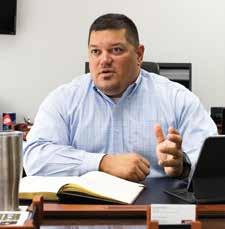
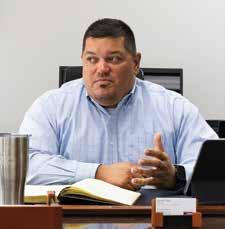
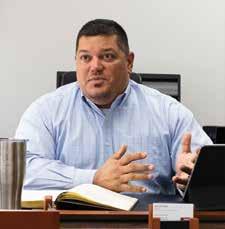
I know people can feel disenfranchised and frustrated with government – whether it’s local, state or national – and there’s a ton of bureaucracy and a ton of problems. There’s truth in all of that, but at the same time, that’s not reason enough not to work hard and to try to make changes and move the ball forward. “ Do you have a particular favorite memory or something that stands out from your time there? “There were a ton, really. For a guy from a town of 3,000 people with two stop lights, the whole experience was amazing. That said, one memory that stands out was a Congressional picnic at the White House when George W. Bush was president. We sat on the White House lawn and had a great conversation with President Bush about Razorback football.
It highlighted again for me what’s possible. If you work at making a difference and dedicate yourself to something, you will find yourself in some pretty amazing and memorable situations.” Could you give us some more details about your personal connections to agriculture? “Growing up where I did and with my dad’s involvement in agriculture, I had a lot of connections. When I was in high school, Hudson
Foods had “company farms” – that was part of their businesses model – and they had five of these company farm complexes with 10 broiler houses on each. Every summer in high school I worked on one of those farms. I’ve done a little of everything – hauled hay for money, raised cattle and pulled Q calves. When I was in D.C., a Farm Bill came through that I was a legislative assistant on, so I got to know the chairman of the House Ag Committee at the time, Collin Peterson of Minnesota. During JY the process, he came to Arkansas several times and I drove him all over the state to meet with farmers.” What are you most excited about in terms of your role at Arkansas Farm Bureau? “What’s most exciting to me is that Farm Bureau is kind of the culmination of my career path. The agriculture business put the food on my family’s table my entire life and then I spent most of my adult life in public service and government affairs work, and this is the intersection of those two things. I’m passionate Q about ensuring the rural way of life. I think that folks in the rural areas – the folks who raise family there, go to school there – are an important part of our country. If we don’t have those folks living in rural parts of the state where agriculture is prominent, then agriculture starts to go away.
Q JY JY
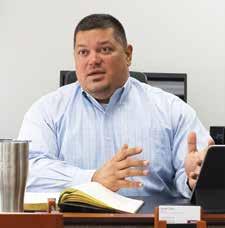
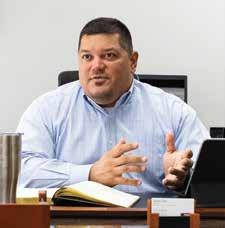

As more and more people move to population centers, those areas get a louder voice. So it’s important for us to be a loud voice for folks in rural areas.”
How was your first visit to D.C. on behalf of Arkansas Farm Bureau? “It was good. There’s still a lot of COVID-19 restrictions in place and partisanship is pretty thick in the air up there, but it was great meeting with the Arkansas delegation. They work well together, and I think we’re fortunate to have that because it gives us strength. We’re in a small state, so we have a smaller delegation, but just because we have a small delegation does not mean we’re not influential in D.C. We have a ranking member on the House Committee on Natural Resources and we have the ranking member on the Senate Ag Committee. Those are important positions for the country, so we’re fortunate in Arkansas that, out of a six-member delegation, we have members in such important roles.” What are your goals, vision and objectives going into 2021? “One of the big things on the horizon for us will be the Farm Bill.
It’s early, as far as that’s concerned, but those discussions have already begun, and as we get into next year, the intensity of those discussions Q will only increase. So, we will be looking at how to shape that next Farm Bill based on the priorities that our members have told us will be important.” JY Q JY
Q JY Q JY
What are some key issues at the federal level right now? “Right now, they’re doing the $3.5 trillion reconciliation budget bill, and within that tax policy changes are being discussed – changes to the estate tax and the stepped-up basis on the inheritance tax. These are the changes that could have a negative impact on farmers, so that’s important. It’s a moving target, though, because they’re changing minute to minute, it seems.” What else should people know about you? Any particular hobbies or interests? “Well, I’m an avid duck hunter. I’ve got a daughter at Fayetteville, who’s a sophomore at the University of Arkansas. And then my son just turned 15 and he plays travel baseball, so I follow him around a lot and that’s what I spend a lot of time doing right now. In summer, I don’t have time to play golf or anything because I’m usually somewhere at a baseball field.” *
You Deserve More. You Deserve a Promise.
For over 70 years Farm Bureau® Insurance’s commitment to our customers has never wavered. In that time, local agents and adjusters have served communities all over Arkansas with home and auto insurance, and more. We believe that your family is part of our family. And protecting families has always been our pledge. Talk with your local agent to learn more about the Farm Bureau Promise.




